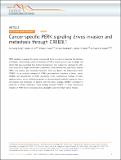Cancer-specific PERK signaling drives invasion and metastasis through CREB3L1
Author(s)
Feng, Yu-Xiong; Reinhardt, Ferenc; Jin, Dexter X.; Sokol, Ethan Samuel; Miller, Daniel Handel; Gupta, Piyush; ... Show more Show less
Downloads41467-017-01052-y.pdf (1.297Mb)
PUBLISHER_CC
Publisher with Creative Commons License
Creative Commons Attribution
Terms of use
Metadata
Show full item recordAbstract
PERK signaling is required for cancer invasion and there is interest in targeting this pathway for therapy. Unfortunately, chemical inhibitors of PERK's kinase activity cause on-target side effects that have precluded their further development. One strategy for resolving this difficulty would be to target downstream components of the pathway that specifically mediate PERK's pro-invasive and metastatic functions. Here we identify the transcription factor CREB3L1 as an essential mediator of PERK's pro-metastatic functions in breast cancer. CREB3L1 acts downstream of PERK, specifically in the mesenchymal subtype of triple-negative tumors, and its inhibition by genetic or pharmacological methods suppresses cancer cell invasion and metastasis. In patients with this tumor subtype, CREB3L1 expression is predictive of distant metastasis. These findings establish CREB3L1 as a key downstream mediator of PERK-driven metastasis and a druggable target for breast cancer therapy.
Date issued
2017-10Department
Massachusetts Institute of Technology. Department of Biology; Koch Institute for Integrative Cancer Research at MITJournal
Nature Communications
Publisher
Nature Publishing Group
Citation
Feng, Yu-Xiong et al. “Cancer-Specific PERK Signaling Drives Invasion and Metastasis through CREB3L1.” Nature Communications 8, 1 (October 2017): 1079 © 2017 The Authors
Version: Final published version
ISSN
2041-1723